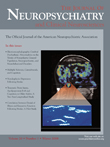Successful Treatment of Delusion of Parasitosis with Risperidone
To the Editor: Delusion of parasitosis is a rare psychiatric disorder in which patients have a fixed false belief of being infested with parasites or other living organisms despite clear evidence to the contrary. 1 The symptoms are often persistent and refractory, 2 and patients usually refuse to seek psychiatric treatment and most frequently consult nonpsychiatric physicians. 3 , 4
Although the vast majority of the cases involve dermatological manifestations 5 and are often treated with typical antipsychotic medications, 1 most commonly Pimozide, 2 some patients may have different presentations. This patient is a 37-year-old man who strongly believed that his spinal cord was infested with worms, and his delusion was successfully treated with risperidone.
The patient was of Italian descent, single, and lived with his mother and older brother.
He graduated high school, worked as a musician to fulfill his interest, and maintained a good social and occupational life. At age 35, he exhibited delusional thinking that led to significant distress in the patient and in his family. He was brought to the emergency room by his mother for psychiatric evaluation.
He presented with the chief complaint “the worms are eating me.” On evaluation, the patient complained of having different types of worms in his spinal cord and that they might eat him. Reportedly, he stopped going to his job and he would eat only garlic and onion, believing that they might kill the worms. He would stay in the bath tub for several hours in order to wash out the worms. He denied having prior history of psychiatric illness, substance abuse, or medical comorbidity.
During the interview he maintained poor eye contact. His speech was low, his mood was anxious, and his affect was irritable. He denied having auditory or visual hallucinations and denied having suicidal ideation. He was alert, awake and oriented to the 3 spheres. His memory and language were intact. His attention and concentration were within normal limits. His fund of knowledge and intelligence were average. His insight was impaired.
He was hospitalized and possible organic causes were ruled out. His laboratory studies, including CBC, chemistry panel, renal function tests, and thyroid function tests, were all within normal limits. His urine toxicology was negative. CT of his brain revealed no pathological findings.
During his hospital stay, he expressed various somatic complaints such as headaches, abdominal pains, constipation, and indigestion. He was anxious, isolating himself and refusing to eat for fear of feeding the worms. He spent a long time in the bathroom waiting for the worms to come out and he was observed holding himself, believing that the worms might come out from his body in front of the other patients and embarrass him.
He was prescribed risperidone and showed marked clinical improvement in his delusional thinking and behavior. Subsequently, he regained his appetite and went back to his work. He was maintained on risperidone, 4 mg/day, and was referred to the outpatient clinic for psychiatric follow up.
1 . Wenning MT, Davy LE, Catalano G, et al: Atypical antipsychotics in the treatment of delusional parasitosis. Ann Clin Psychiatry 2002; 15:233–239.Google Scholar
2 . Reilly TM, Jopling WH, Beard AW: Successful treatment with pimozide of delusional parasitosis. Br J Dermatol 1978; 98:457–459.Google Scholar
3 . Sadock BJ, Sadock VA: Kaplan and Sadock’s Synopsis of Psychiatry: Behavioral Sciences/ Clinical Psychiatry, 9th ed. Philadelphia, Lippincott, Williams & Wilkins, 2002Google Scholar
4 . Winsten M: Delusional parasitosis: a practical guide for the family practitioner in evaluation and treatment strategies. J Am Osteopath Assoc 1997; 97:95–99Google Scholar
5 . Ford EB, Calfee DP, Pearson RD: Delusions of intestinal parasitosis. South Med J 2001; 94:545–547Google Scholar



